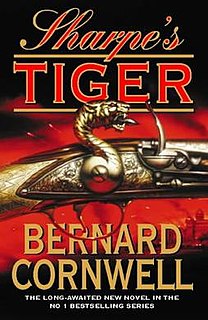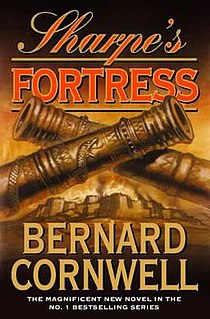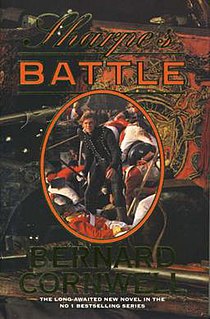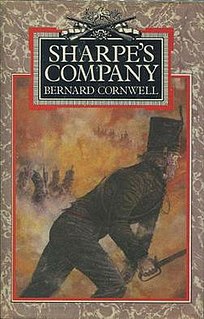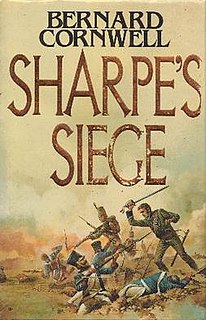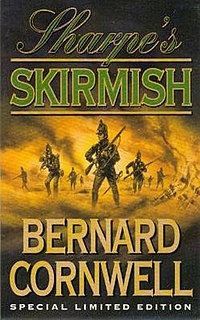Plot summary
Major Michael Hogan orders Sharpe to find out what happened to Claud Hardy, one of his exploring officers, who was sent to locate the gold thought to be in the fictional hamlet of Casatejada.
Sharpe sets off with the men of his small company as his sole military support and links up with Major Kearsey, another of Hogan's exploring officers. It becomes clear to Sharpe that Kearsey believes that the gold belongs to the Spanish and should only be returned to them, and that that is the purpose of the mission they are on. However Sharpe has secret orders that the gold must be taken to British lines and begins to doubt Kearsey is aware of them. They meet the local partisan commander El Catolico, who is engaged in a bitter struggle with local French cavalry.
A partisan is a member of an irregular military force formed to oppose control of an area by a foreign power or by an army of occupation by some kind of insurgent activity. The term can apply to the field element of resistance movements, examples of which are the civilians who opposed Nazi German, Fascist Italian and Ustaše Croatian rule in several countries during World War II.

Cavalry or horsemen are soldiers or warriors who fight mounted on horseback. Cavalry were historically the most mobile of the combat arms. An individual soldier in the cavalry is known by a number of designations such as cavalryman, horseman, dragoon, or trooper. The designation of cavalry was not usually given to any military forces that used other animals, such as camels, mules or elephants. Infantry who moved on horseback, but dismounted to fight on foot, were known in the 17th and early 18th centuries as dragoons, a class of mounted infantry which later evolved into cavalry proper while retaining their historic title.
Kearsey is captured by the French and Sharpe decides to go into the town and liberate him and ascertain the location of the gold. They succeed though suffer some losses in personnel but succeed in freeing not only Kearsey but also Teresa Moreno and her brother Ramon who were to be tortured by the French. The Spanish guerillas soon enter the town.
El Catolico is intensely suspicious of Sharpe being so far behind the French lines and suspects the British desire the gold so they can take it when they leave Portugal. We see Sharpe develop an attraction to Teresa who is betrothed to El Catolico. Her father is his second-in-command. Kearsey appears in awe of El Catolico and the Spanish generally. Sharpe decides to leave him out of future decisions. El Catolico claims there is no gold and that the French took it.
Having been escorted from the town by partisans Sharpe and the men double back later that night to undergo a further search of the town. Sharpe is captured by El Catolico but is freed by Patrick Harper who discovered the gold hidden in a manure patch. Sharpe's men surround the Spanish and they take Teresa as a hostage. Kearsey is utterly disapproving of what Sharpe has done but follows the other British soldiers. It seems Hardy was murdered by El Catolico.
They head for the fortress of Almeida and are harried by both the partisans and by French troops en route to the siege. Sharpe and Teresa consummate their relationship and fall in love. Sharpe and the men are saved from the French by a unit of German cavalry under Captain Lossow who was sent by Hogan to locate them and take them to Almeida. The officers meet with the commander of the fortress, the English Brigadier Cox. Cox has had no orders from General Wellington to let them pass unheeded and is suspicious of the lack of orders. Kearsey gives no help and it transpires that El Catolico and his men entered the fortress on the same night and lodged a claim on behalf of the Spanish government to take back the gold.
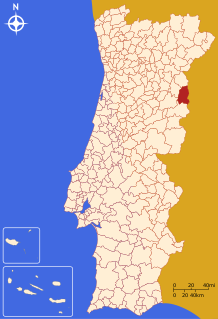
Almeida is a fortified village and a municipality in the sub-region of Beira Interior Norte and the District of Guarda, Portugal. The town proper has a population of 1,300 people (2011). The municipality population in 2011 was 7,242, in an area of 517.98 square kilometres. It is located in Riba-Côa river valley. The present Mayor is António Baptista Ribeiro, elected by the Social Democratic Party. The municipal holiday is July 2.
Efforts to contact Wellington are in vain as the telegraph is blown up. Cox orders the gold be returned and that Sharpe and his men enlist in the garrison to resist the siege. That night we have a showdown between Sharpe and El Catolico on the roof above Sharpe's bedroom window. Sharpe is victorious, but, realising that his opponent was superior, impaled his leg on the Spaniard's sword so he could render the coup de grace.
Demonstrating his ruthlessness, Sharpe ignites an explosion in the magazine of the fortress, which causes a great deal of casualties and considerable damage to the fortress walls. It becomes clear that the fortress will fall much sooner than expected and Sharpe and Lossow are allowed take their men away.
A magazine is a publication, usually a periodical publication, which is printed or electronically published. Magazines are generally published on a regular schedule and contain a variety of content. They are generally financed by advertising, by a purchase price, by prepaid subscriptions, or a combination of the three.
Teresa returns to the partisans, taking the name La Aguja (the Needle). It transpires that the gold was needed to develop the enormous defensive Lines of Torres Vedras which held up the French invasion of Marshal André Masséna. Sharpe takes the opportunity of some leave to renew his acquaintance with Josefina, his love interest from Sharpe's Eagle , prompting the reader to speculate on the degree of attraction between himself and Teresa. The lines of Torres Vedras are better described in Sharpe's Escape .

The Lines of Torres Vedras were lines of forts built in secrecy to defend Lisbon during the Peninsular War. Named after the nearby town of Torres Vedras, they were ordered by Arthur Wellesley, Viscount Wellington, constructed by Sir Richard Fletcher, 1st Baronet, and his Portuguese workers between November 1809 and September 1810, and used to stop Masséna's 1810 offensive.

André Masséna, 1st Duc de Rivoli, 1st Prince d'Essling was a French military commander during the Revolutionary and Napoleonic Wars. He was one of the original eighteen Marshals of the Empire created by Napoleon, with the nickname l'Enfant chéri de la Victoire.
References or allusions
References to actual history, geography and current science
Sharpe’s story continues to be "intimately linked" [1] with the real-life story of Sir Arthur Wellesley, who appears again in this book. Here the Duke is suffering from money worries as Cornwell states he "knew that money kept an army efficient". [2]
Although El Catolico and his treasure trove are literary inventions, the guerrillas and gold alluded to in this novel were an important part of the war against France ("the twin allies of British victory"); Cornwell admits that the "Sharpe books do not do justice to the guerillas". [2]
The books tells a fictionalised account of the destruction of Almeida which, as Cornwell notes "conveniently for a writer of fiction", [3] remains a mystery. The Lines of Torres Vedras mentioned at the end of the novel are also a historical reality. Both sites were visited by the author during his research for the novel.
The book demonstrates the military etiquette followed by armies of the time. Sharpe's wounded are cared for by the French surgeons, as the British would do to the French, but the guerrillas can only expect a gruesome death as they mete out to their French opponents.
References in other works
The character of Teresa Moreno who is introduced in this novel goes on to play an important role in the following books of the series. The characters of Contessa Josefina and Claud Hardy were introduced in Cornwell's previous novel Sharpe's Eagle .
This page is based on this
Wikipedia article Text is available under the
CC BY-SA 4.0 license; additional terms may apply.
Images, videos and audio are available under their respective licenses.








